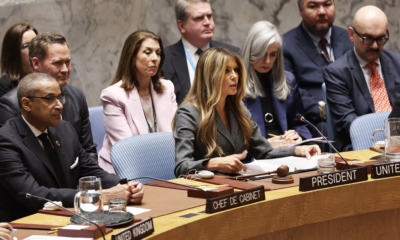Trump Presidency
As Markets Tank, Donald Trump Unveils $5 Million “Gold Card” Visa with His Face on It
President Donald Trump has announced the launch of a $5 million “Gold Card” visa program featuring his own likeness. Speaking to reporters aboard Air Force One, Donald Trump introduced the investment-based residency program, which he described as “the Trump Card”—a golden pathway to U.S. residency for those willing to invest millions into the American economy.
What Is the “Gold Card” Visa?
The Gold Card is positioned as a “green card plus”, offering foreign investors a route to U.S. residency in exchange for a $5 million investment in American businesses. The program is intended to replace the current EB-5 visa, which requires a minimum investment of $800,000 to $1 million and the creation of at least 10 American jobs.
According to Commerce Secretary Howard Lutnick, the program has already generated massive interest, with 250,000 applicants and $5 billion raised in a single day from the sale of 1,000 Gold Cards. However, official applications do not yet appear to be available on the U.S. Citizenship and Immigration Services (USCIS) website.
Trump’s first question to the press was simple: “Who is the first buyer?” He quickly answered: “Me.”
Supporters vs. Critics
Donald Trump and his supporters argue that the Gold Card will attract wealthy individuals who will invest heavily in the U.S. economy. Senator John Cornyn praised it as the “ultimate merit-based immigration”, suggesting that attracting high-net-worth individuals would benefit all Americans. However, critics say the policy prioritizes wealth over talent and skills, effectively selling U.S. residency to the highest bidder. Congressman Ro Khanna criticized the plan, stating, “You don’t need $5 million in your bank account to build a successful company in America. Just look at Sergey Brin, Sundar Pichai, or Satya Nadella.” He argued that America should focus on attracting skilled workers and entrepreneurs, not just billionaires.
Further concerns have arisen over tax implications. Unlike U.S. citizens and green card holders, Gold Card holders would reportedly be exempt from U.S. taxes on overseas income—a major deviation from existing tax laws. Legal experts are calling this provision “impossible to implement” without a major rewrite of U.S. tax policy, which Congress is unlikely to approve.
Trump Tells NBC Not Joking about the Third-Term, Clashes with Putin
Economic Fallout & Market Reaction
The Gold Card announcement comes at a turbulent time for U.S. markets. Just a day prior, Trump unveiled a 10% baseline tariff on all imports, targeting 60 countries with additional “reciprocal tariffs.” Markets reacted negatively, with U.S. stock futures plummeting. When asked about the market downturn, Trump dismissed concerns: “I think it’s going very well. It was an operation, like when a patient gets operated on, and it’s a big thing. But trust me, the markets will boom, the stock will boom, the country will boom.”
Despite Trump’s confidence, the Gold Card faces major legal and legislative hurdles. Critics argue it violates the spirit of fair immigration, while economic analysts worry about its long-term impact on tax laws and economic inequality.
The card is expected to be officially available in two weeks, but its future remains uncertain as lawmakers and legal experts debate its feasibility.












































Pingback: Trump’s H-1B Politics Risks US-India Tech Ties and Family Stability